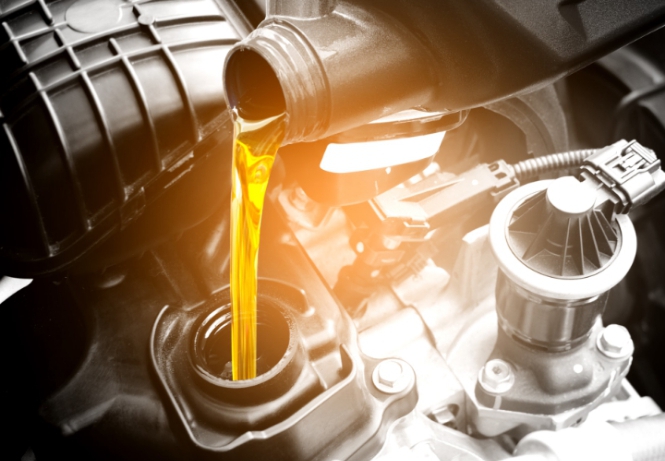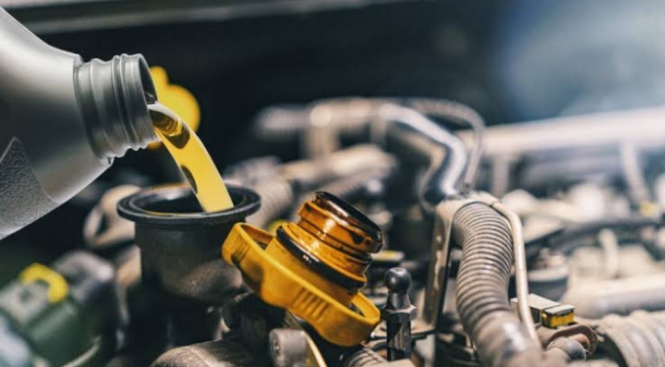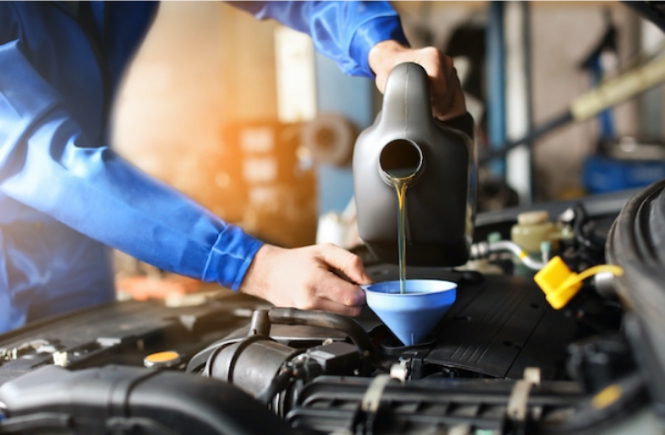
Jeep Engine Oil Change
Table Of Content
-
1 Importance of Engine Oil
- 1.1 When to Get a Jeep Oil Change?
- 1.2 Why Regular Oil Change Matters?
- 1.3 Tips for Jeep Oil Change
-
1.4 Signs that Need Oil Change
- 1.4.1 Frequent decrease in Oil Level
- 1.4.2 Ticking Noise
- 1.4.3 Exhaust Fumes
- 1.4.4 Louder Engine
- 1.5 Jeep Oil Types and Recommendation
-
1.6 Jeep Oil Change Step by Step Guide
- 1.6.1 Step 1: Park Your Jeep
- 1.6.2 Step 2: Get all Tools Required
- 1.6.3 Step 3: Open the Front of Your Jeep
- 1.6.4 Step 4: Find Oil Drain Plug and Oil Filter
- 1.6.5 Step 5: Drain Old Oil
- 1.6.6 Step 6: Remove Oil Filter
- 1.6.7 Step 7: Place New Oil Filter
- 1.6.8 Step 8: Place Oil Drain Plug
- 1.6.9 Step 9: Add New Fresh Oil
- 1.6.10 Step 10: Start Vehicle and Check for any Leakage
- 1.6.11 TIPS
- 1.7 Frequently Asked Questions
- 1.8 Conclusion
Owning a Jeep brings a lot of fun, adventure and power, but with great things comes great responsibilities. Right?
Changing engine oil is the primary important task to protect your jeep from wear and tear, damages and engine failure. It is, however, not so easy.
The engine's oil needs to be changed regularly to prevent excessive wear and tear. The oil level in Jeep vehicles should be changed every 5,000 to 10,000 miles, depending on the model.
You know what! Changing the oil is one of the most basic tasks you can do yourself. This saves you money while helping you understand your vehicle better, isn't it impressive?
It is not that simple! But I am here to guide you through each step of changing oil and other important aspects.
Like, When should you change the oil in your Jeep? What kind of oil should you use for your Jeep? Also, how to change the engine oil in a Jeep.
Ready to start? Let’s move down the article and change your vehicle engine oil within a minute.

Importance of Engine Oil
Engine oil is a very important thing in every vehicle that supplies power and life to the vehicle to perform tasks.
Do you know how it is a vital component? Lemee makes it clear for you.
Engine oil is used to lubricate the moving components of the engine which prevent overheating by reducing friction and also it removes extra dust and dirt.
Yeah! It’s a brief overview of jeep engine oil before diving down into the exact topic. Got it?
When to Get a Jeep Oil Change?
So readers! Did you ever think? What is the right time to get your jeep an oil change? However, let’s see the answer to it.
The oil in Jeep vehicles should be changed every 5,000 to 10,000 miles, depending on the model and conditions where the vehicle is driven.
Can I make it more clear for you?
- For synthetic oil, every 7,500 to 10,000 miles.
- For conventional oil, Jeep SUVs require oil changes every 3,000 to 5,000 miles.
It is a general statement about engine oil change for jeeps but follow below, I'll tell you signs and tips to understand what is the perfect time to change jeep engine oil. Ok? For now it’s enough.
Why Regular Oil Change Matters?
As a jeep owner you should know what are possible ways to make your vehicle better and get more out of it.
So here I am telling you the importance and benefits of regular oil change which you must keep in consideration. Can I start? Let’s move ahead.
- Reduced friction in the engine reduces fuel economy with fresh oil.
- In order to prevent engine overheating, oil circulates properly to dissipate heat.
- Maintaining engine efficiency: Oil removes dirt, debris, and contaminants from the engine.
- Maintaining regular oil changes is an easy and cost-effective way to extend the life of your Jeep's engine.
- Keeping your engine lubricated reduces friction and heat by lubricating its moving parts. As a result, your engine will last longer.
Hope so, you get some useful points.
Tips for Jeep Oil Change
Next now grab a pen and copy as I am giving you very important tips that will help you alot during the jeep oil changing process.
Change Oil Even if You Don’t Drive Much
It may seem possible to go longer between oil changes if you don't drive frequently. Sadly, oil deteriorates even after you stop driving.
Even if you haven't travelled 7,500–10,000 miles, you should update your oil once or twice a year. Got it?
Get Dealer Suggestion
Ask your dealer for advice if you're unsure about how frequently to change your oil.
So, How often you should replace your oil can be determined by speaking with a Jeep specialist.
Analyze Oil Regularly
You should regularly check the level of our oil. In addition to verifying the amount of oil you have left, you should also examine the oil's consistency.
It is time for an oil replacement if the texture of your oil has changed.

Signs that Need Oil Change
If your Jeep mileage isn’t covered and you're not sure whether it is exact time for jeep oil change or not, so can notice these few sign to decide what to do.
Frequent decrease in Oil Level
First! Oil levels falling faster than usual indicates a problem with the system. For that I recommend you to, Have a technician check it out.
The technician will inspect the system, and they will also change the oil.
Ticking Noise
Another sign that you need an oil change is if your Jeep's engine ticks when you start it. If your soil's texture has changed, you'll hear a ticking sound.
Exhaust Fumes
One sign is, When you see smoke coming out of your tailpipe, then that's a sign that your oil isn't working correctly, so get it changed so your vehicle can operate normally again.
Louder Engine
A faulty engine or old oil may be the cause of your noisy engine. It’s your sign to, Get your engine repaired or replaced by a technician.
Does it help?
Jeep Oil Types and Recommendation
Here are some other important points that you need to know before starting to change your jeep’s engine oil; and that are
Synthetic Vs Conventional Oil for Jeep
Conventional oil differs from synthetic oil in the following ways:
- Easily oxidised and acidified.
- It has a lower chemical stability.
- Loss of protective properties due to breakdown.
Conversely, synthetic oil is better at:
- Engine wear can be reduced.
- Maintaining a sludge-free environment.
- The control of oil breakdown.
- Controlling high temperatures.
Got it?
Best Jeep Oil Types
The modern Jeep SUV uses synthetic oil most often since it's more refined, lasts longer, and regulates heat better. For Jeep SUVs, these oil types are recommended:
- Type of oil for Jeep Wrangler: 0W-20 synthetic oil.
- Suitable oil type for Jeep Cherokee: 5W-20 synthetic oil or 10W-30 synthetic oil (Can also be used 0W-20 synthetic oil).
- The oil type for Jeep Compass is T0W-20, which is a fully synthetic oil.
- The oil type for the Jeep Grand Cherokee is 0W-20 synthetic oil.
- There are two types of Jeep Gladiator oil: 0W-20 oil for 3.6L engines and 5W-40 oil for 3.0L engines.
- There are two types of oil for Jeep Renegade models: 5W-40 synthetic oil for 1.4L engine models and 0W-20 synthetic oil for 2.4L engine models.
You can also consult mechanics for guideline.

Jeep Oil Change Step by Step Guide
You know what oil changing is just done by a few basic steps and amazingly you can do it by yourself.
It will save your time, money and importantly it will help you to understand your vehicle system and connect you to it.
However, it isn’t that simple. Follow each and every step of jeep oil change more consciously to avoid any misleading and confusion
Let’s start changing Jeep Engine Oil with me.
Step 1: Park Your Jeep
I know most of you know how you can prepare your jeep for oil change, but those who don’t, lemme tell you first.
You need to park your jeep on a perfectly levelled surface. For automatic transmission you can place it in a “Park” and for manual transmission ensure it is in gear.
For ensuring safety you can also engage parking brakes.
Ok? done
Step 2: Get all Tools Required
Before starting the process geather some tools which you are gonna use during the process of changing the engine oil.
These required tools are listed as;
- Oil Filter Wrench
- Oil Drain Pan
- Oil Filter (Make sure it works with the engine of your Jeep Wrangler).
- New Oil (Check the manual for your Jeep Wrangler to find out what kind and amount of oil is recommended. It is typically 5W-20 or 5W-30 for the majority of models).
- Socket
- Funnel
- Wrench
- Jack Stand
- Rugs or Towel
- Safety Glasses and Gloves
Let’s get them quickly.
Step 3: Open the Front of Your Jeep
Now we have to start the process, for that you need to open and elevate the front of your jeeps. You can use jack stands or ramps to tight it securely.
Once you ensure that it is safe and secure then you can crawl underneath.
Step 4: Find Oil Drain Plug and Oil Filter
In some vehicles the oil drain plug and oil filter are located in various places than usual so you have to figure out their location first.
Well! In most cases
- the oil drain plug can find out at the bottom of oil pan
- and oil filter is located at the side of your engine.
Find out? Let’s move ahead.
Step 5: Drain Old Oil
Now you have to drain out all the old oil from the plug so that you can use a socket and open the plug. Also make sure to place the oil pan beneath the oil drain plug so that all oil can drain into the pan.
Don’t hurry, let it drain completely and take it time.
Step 6: Remove Oil Filter
After that you have to remove the oil filter, make use of a wrench to help you out in opening the oil filter.
Step 7: Place New Oil Filter
Yeah! Next you have to place your new oil filter in place of the old one. For that I recommend you to place some amount of fresh oil on edges and on a rubber basket which is at top of the filter which makes a good seal.
After that just simply tighten it by using your hands.
Step 8: Place Oil Drain Plug
Once all the old oil gets drained out then your next task is to place and tighten the drain plug back into its place by using a socket set. Don’t over-tight it.
Step 9: Add New Fresh Oil
Pure oil into the engine by using a funnel, add just the recommended amount.
- You can check jeep manually for exact oil capacity
- Also for more exact results use a dipstick and check oil level.
Do it consciously and don’t hurry.
Step 10: Start Vehicle and Check for any Leakage
Lastly, you have to start and run your vehicle for few minutes for proper oil distribution. Ok!
TIPS
After that you are done! But still i want to share some personal tips and suggestions;
- While the engine is running, look for any indications of leaks near the drain plug and oil filter.
- Turn off the engine and tighten the impacted region if you think there are any.
- Don't pour used oil into the ground or down the drain either.
- Alternatively, you can take it to a recycling facility or an auto parts business that recycles spent oil.

Frequently Asked Questions
What are the signs that my car is leaking oil?
Maintain a regular oil dipstick check. Well! Oil leaks can occur from worn parts, including engine gaskets, oil pans, and oil seals. Other than that, Blue smoke or burnt oil odours may also emerge from your tailpipe.
How often Should I change engine oil?
The oil in Jeep vehicles should be changed every 5,000 to 10,000 miles, depending on the model and conditions where the vehicle is driven.
Conclusion
Jeep oil change is very important to consider and you must keep it maintained regularly. Consider when it shows you signs that you need an oil change and change engine oil.
Change your jeep oil by following the steps and tips that I mentioned. Also confirm your vehicle compatible oil type and capacity before dining down into the process.
If you want more information on engine oil change you can see it here.





0 Comments